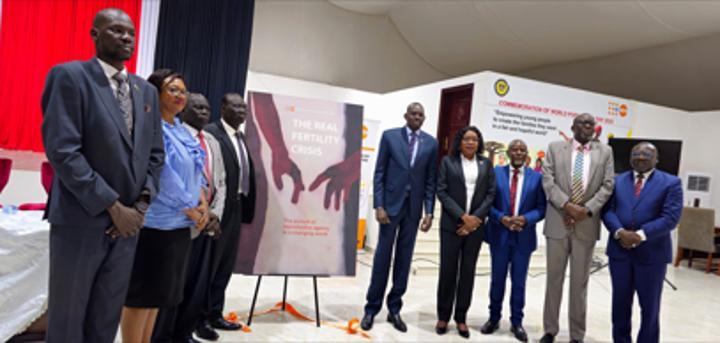Africa-Press – South-Sudan. The United Nations Population Fund (UNFPA) has raised alarm over South Sudan’s high fertility rate and poor access to family planning services.
The report warns that the country’s rapid population growth could overwhelm public resources and stall development. The warning was issued during the launch of the 2024 State of the World Population Report, held on Friday at the Transitional National Legislative Assembly in Juba.
The event also marked World Population Day, observed annually on July 11 to raise awareness about global population trends and their implications.
According to the report, South Sudan’s fertility rate stands at 5.3 children per woman, more than double the global average of 2.2. While developed nations are seeing fertility rates decline, countries like South Sudan are experiencing the opposite, mainly due to limited access to reproductive health services and a lack of choice.
“South Sudan’s fertility rate is not only high but largely unplanned. Many people are unable to have the number of children they actually desire, whether more or fewer, due to the lack of reproductive choice,” said Francis Tukwasibwe, UNFPA representative in South Sudan.
He added that one in three pregnancies in the country is unintended, with many couples unable to access modern contraceptives.
“This is not just a health issue, it is an economic one,” he stated. “Unplanned births increase household poverty, stretch public services, and deepen gender inequalities.”
For his part, Benjamin Ayali Koyongwa, the Undersecretary for Planning in the Ministry of Finance and Planning, presented stark projections that South Sudan’s population could rise from 12.4 million to more than 48 million by 2061 if current trends continue.
“This population explosion demands urgent and strategic planning,” he warned. “We must invest in health, education, and employment for the growing youth population or face a severe strain on resources.” He listed some of the demographic challenges, such as Rural fertility rate of 6.5 children per woman, Family planning access at just 4% nationally, and an annual population growth of 4%, one of the highest in the world.
The report calls for a national roadmap to harness the demographic dividend, the economic benefits that come when a country’s working-age population grows relative to its dependents. But for South Sudan to benefit, birth rates must decline and investment in youth must increase.
“We need to act now,” Koyongwa urged. “The future of our young men and women depends on what we do today.”
UNFPA is urging the government to scale up access to family planning to at least 40% by 2040, invest in health infrastructure, reduce maternal mortality, and establish a National Population Council to coordinate efforts.
This year’s World Population Day celebration was themed: “Empowering Young People to Create the Families They Want in a Fair and Hopeful World.” The message hit home in South Sudan, where more than 70% of the population is under 30.
Meanwhile, Majur Babur, the chairperson of the South Sudan Parliamentary Network for Population and Development (SSNPND), said the day’s celebration was historic.
“Today we are celebrating the World Population Day for the first time in the Transitional National Legislative Assembly… the August House that represents the will and the voice of the population of this young country,” he said. “This big percentage of young people is already a huge demographic dividend… if properly taken care of in terms of health, education, and enabling environment.”
However, he also acknowledged that youth face challenges, including early marriage, gender-based violence, unemployment, and lack of access to health care.
For her part, Anita Kiki, Deputy Special Representative of the UN Secretary-General, warned that South Sudanese youth are growing up amid a “perfect storm” of overlapping crises from climate shocks to economic hardship.
“Over 1.2 million people have crossed the border into South Sudan. We are preparing to support over 1 million people due to flooding,” she disclosed. “Disease outbreaks such as cholera, localized insecurity, all leading to mounting needs.”
Despite this, Kiki stressed that hope remains if young people are empowered and included in national solutions.
“Young people must be part of and at the heart of solutions. By investing in their education, health, and economic empowerment, we unlock one of the most powerful drivers of sustainable development,” she counseled.
She also urged Parliament to fast-track legislation currently under discussion, including the Women’s Empowerment Bill, Anti-GBV Bill, and the National Youth Development Policy.
Finance Minister Marial Dongrin Ater said South Sudan is a home to one of the youngest populations in the world, with more than 70% of the citizens under the age of 30.
“Realizing these demographic dividends will not happen by chance, but requires deliberate, coordinated, and sustained action,” he stated.
On her part, Health Minister Sarah Cleto reminded South Sudanese that the challenges are not just at the policy level, but also personal and cultural.
“They [South Sudanese] are navigating choices about their health, their relationships, their futures often without the information or support they need,” she said. “In most cases, we in South Sudan still feel discussing sexual and reproductive health is a taboo, but all of this should start in the family before they go to school.”
Cleto added that her ministry is working closely with UNFPA and other partners to improve access to youth-friendly health services that support informed reproductive choices, reduce unwanted pregnancies, and prevent disease.
For More News And Analysis About South-Sudan Follow Africa-Press






